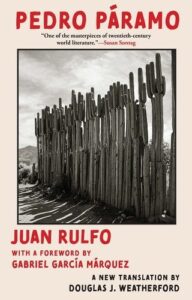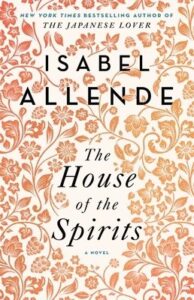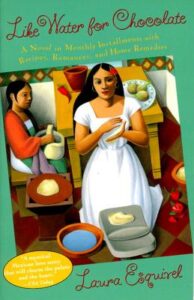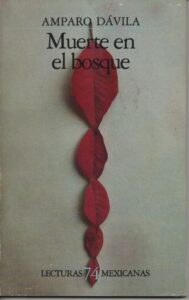When my Abuela died in early 2021, I couldn’t say goodbye to her in person. The day that she died, I felt her at the end of my bed. I was twisted in guilt. I was asleep, but it was a flimsy sleep, not deep. She was laughing at me. “What are you crying for? I’m here.”
Years later, I wonder if what I perceived as a “visit” was a yearning. Statistics say that two in five Americans believe in ghosts. Not a small amount. I was surprised by this, considering that whenever I speak about ghosts with friends, they are skeptical. People quote memory being unreliable, the heart being capricious, or even emotions playing tricks on you, but I have never seen it this way.
Back on Colombia’s Caribbean Coast, I grew up with an abundance of ghost stories. When I would go to the hair salon, the hairdresser would cut my hair while telling me a ghost story; other patrons wouldn’t question it or ask me if I was scared or haunted by the experience. Instead, they would share their own. Ghost stories were an invitation to share and explore the deep threads that were our family stories, the excavations of our lineage, and who we were. To question them was no fun. It was more fun to learn the details.
Sometimes, the ghosts are strangers, faces, or bodies that we see because they’re haunting a house or lingering in a property that belonged to them, but sometimes, they’re the echo of a loved one’s spirit, wanting to deliver a message or simply keep us company. But is this connection to ghosts real? The world of ghosts in Latin America is extensive, from a rich Latin American tradition of magical realism in literature (Gabriel García Marquez, Carlos Fuentes, Isabel Allende, etc) to art, to telenovelas and movies.
I was always attracted and intrigued by how the ghost was always a family member; someone who returns to deliver a message or to resolve a situation that wasn’t dealt with in life. I was also impressed that authors always called the ghosts for what they were: Ghosts.
But could I be so brave? When I started writing my debut novel, The Waves Take You Home, I knew I wanted to include a ghost character. In my book, the character Vi returns to Caminito, the family restaurant, and communicates with her grandmother’s ghost to help her save the restaurant. There is so much that was left unsaid between them. I knew I wanted this return home to be a way of helping these two characters finally talk to each other, even if it was only possible after one of them was dead. But how to best represent a ghost? How did I make it feel real and natural without running into clichés or cheesy representations? How could I honor my own experiences?
As I wrote my novel and grappled with these questions, I turned to books for inspiration, Books that would help me create a ghost that felt natural to me and as real and complex as any living and breathing character.
*

Pedro Páramo by Juan Rulfo
I re-read Pedro Páramo last year in a shaky plane traveling from Oaxaca to México City. Despite gripping the armrest the whole time, the novel is so mesmerizing it kept me present in the reading. A Latin American classic, Pedro Páramo is a novel by Juan Rulfo that follows the story of Juan Preciado, who travels to Comala México to find his father. It doesn’t take long for Preciado to realize that the town is filled with ghosts of the deceased—including his father.
Pedro Páramo is a gorgeous and complex exploration of family lineage. This book showed me the power of focusing on how, after someone’s death, we can see parts of them and their history more clearly and the painful parts of ourselves and our history this exploration can reveal. A haunting read.

Doña Flor Y Sus Dos Maridos by Jorge Amado
Funny, irreverent, and sexy are three words that I’d use to describe Doña Flor Y Sus Dos Maridos (Doña Flor and her two Husbands). It follows the story of Doña Flor, who marries the life-of-the-party but irresponsible Vadihno, only to become a widow after his sudden death after Carnaval. She re-makes her life and marries the reliable Dr. Teodoro, but after their wedding night, she discovers that Vadihno’s ghost has returned.
A novel about desire, passion, relationships, and tradition, this book explores the search for a fulfilled and happy life while highlighting Brazil’s way of life and culture.

The House of The Spirits by Isabel Allende
The House of the Spirits by Isabel Allende is one of my favorite books. An intergenerational novel, it tells the story of the Trueba family against a tumultuous political time in Chile. The story starts with young Clara, a girl who can move things with her mind, and her marriage to power-hungry Esteban. As the family grows, so do the tribulations and unrest of the family and Chilean history.
This novel establishes that life and history are cyclical. One of my favorite aspects is the treatment of the magical elements combined with the real problems the characters face: war, illness, social class, exile, etc. This novel is another Latin American classic, one of the most memorable and epic books you’ll ever read.

Like Water For Chocolate by Laura Esquivel
Like Water For Chocolate is a book centered around Tita, a woman whose family tradition dictates she’ll never marry because the youngest daughter must take care of the mother until she dies. She longs for her lover, Pedro, but instead, she must resign to a life of endless chores and dishes to prepare in the kitchen alongside Nacha, the family’s cook; all of this develops during the agitated times of revolutionary Mexico.
It’s another of my favorite books for the complex intergenerational relationships and the delicious food narratives. This book has fewer ghosts than the others, but the ghost that does appear, the ghost of Tita’s mother, is a powerful one. She represents guilt, family, and following tradition, even if it means sacrificing your happiness.

Muerte en el Bosque by Amparo Dávila
Muerte en el bosque by Amparo Dávila is a short story collection that revolves around themes of ghosts, anxiety, and other hauntings. The short story Muerte en el Bosque (Death in the Forest) follows a husband overwhelmed by his wife’s demands and the increasing responsibilities of his life, and who decides to escape to the woods to run from it all.
Dávila is a master storyteller of the dark, the psychological and the anxiety-inducing, showing us how the mundane can merge with the darkness and the sense that the ghosts of our lives, the ones that rob us of our peace, can manifest the day that we least expect it.

Aura by Carlos Fuentes
Required reading in most Latin American schools, Aura by Carlos Fuentes, explores the haunted corners of Mexican history and the surrealism of our desires. It follows Felipe Montero, a young historian who takes a job transcribing the memoirs of the dead husband of an elderly widow named Consuelo Llorente. As he spends more time in the house, he becomes infatuated with Aura, Consuelo’s beautiful and mysterious niece. Is she real or is she a product of his imagination? A dark and unique atmosphere makes for an exceptional read that blurs the lines between reality, illusion, and desire.
This book reflects on the nature of history, love, and even reincarnation. It is a book you can read in a couple of hours, but it will undoubtedly have you thinking about the ending for a long while.
__________________________________

The Waves Take You Home by María Alejandra Barrios Vélez is available from Lake Union Publishing.
